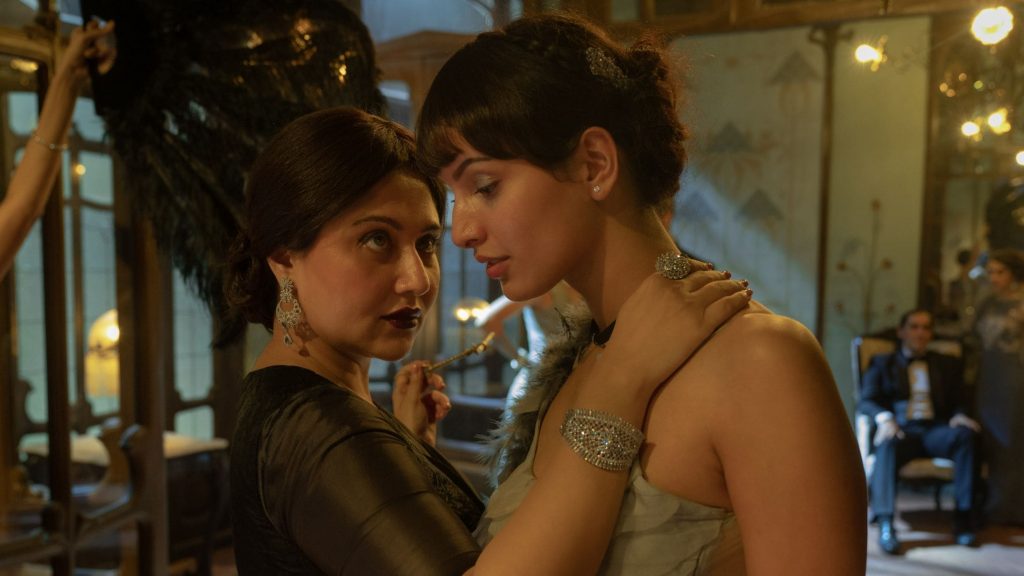Qala is obviously an acquired taste. It broods and contemplates far too much, but at its heart, it has a familiar story to tell about artistic aspiration becoming a conduit for discovering the fractured, personal self. At times a little too decorated for its own good, the film can also seem obsessed with poeticizing the banal and exotifying the mechanical.
The sum of these parts, however, is memorable, if the familiar story is told through the syntax of arthouse and horror. As an audio-visual artifact at least, this is a specimen worth discussing, poring over, and preserving.
Qala stars Tripti Dimri as a gifted young vocalist who is the toast of the town in pre-Independence India’s film industry. The sight of her conquests is modern-day Kolkata, though we rarely get to take a peek at the city’s streets. Qala is a celebrated singer, serenaded by men and ministers alike. She is also, as an extension of working in the film business, surrounded by leering men. The first scene itself places her centre, at a press conference overrun by male journalists.
Her reputation and fame, however, have a grim backstory. Qala is born to a doting but demanding mother in Diwan Manjushree, played by Swastika Mukherjee. The film regularly jumps between these two phases of her life, a sequestered but testing childhood somewhere in the snowy hills between Solan and Shimla and the dizzy heights of stardom in an industry that though it looks warmer, is possibly the coldest place on the planet.

In a scene from Netflix’s Qala, a mother tells her daughter “Naam ke aage pandit lagna chahiye, uske peeche bai nahi”. This bit of worldly wisdom feels loaded with unseen but readable context. Hidden behind the mother’s worn eyes is possibly a lifetime spent learning a woman’s place in a brutalising man’s world. Her ambitious daughter, won’t have it easy, or worse, she might never have it at all.
Qala is about an artist’s pursuit of a vague form of excellence and approval but it is also about the unsaid bond a mother and daughter share. Directed by Anvita Dutt, Qala can often overindulge its eerie atmospherics but at its core it is a deeply poignant narrative about art, aspiration and of course gender.
As a parenting hardliner, Manjushree entrusts the harshest methods to teach Qala the most valuable lessons. From banishing her daughter from the house in the night, to replacing her with newfound, obscure talent, Manjushree is both the seed and the sickle.
At a concert organised for Qala’s musical debut, the headlines are stolen from under her endearing countenance by the rookie Jagan (played by Irrfan Khan’s son Babil). Jagan’s voice, his raw talent becomes the line of division that distances Qala from her mother. Not only is he far more talented, but he is also the one thing she can never be – a man.
While Dutt’s previous film attempted to rewrite a popular fairy tale here she reproduces a portrait of the artist as an incomplete woman. A woman who though she ascends to a certain pedestal in public life, descends to a far darker place on the inside. No ascent, it feels, comes without a cost, but for women it comes at the exponential price of having to also play your gender.
Success can be grabbed, but not without loosening the grip on things you hold dear. It’s a truism that Manjushree beats into her daughter early. It’s possibly also the kind of truth that eventually becomes her undoing. Some lessons are maybe better not learned at all.
Of the performances, none disappoint. Dimri is brilliant as the naïve and yet quietly sinister Qala the tragic monolith at the heart of a film that says as much about art as it does about the emotional cost of ‘making it’. Babil Khan is adequate though never really sensational. Amit Sial is, well, effortlessly brilliant as ever as a blunt and quietly lecherous composer. Varun Grover, in his acting debut, is serviceable at best.

This film is a broody mix of stunning music, magical setups and some truly arresting art direction. As was the case with Dutt’s previous project, it is also a film that shouts detail and authenticity at various points and is supported by a palette that brings out the lustre of a bygone era in Indian cinema.
It obviously feels nostalgic and is given the gothic treatment that also makes it equal part horror and drama. To which effect, Qala has hallucinatory episodes. Her rise in the industry itself, is punctuated by greased palms and more, a nod to the many ceilings women must task themselves with breaking. And at the end of it all, the pinnacle is satisfyingly distant from the mob, but overwhelming close to the edge.
The top of the pyramid, the film tells us, is a deeply lonely place. It is lonelier still for women who get there at some personal and emotional cost.

